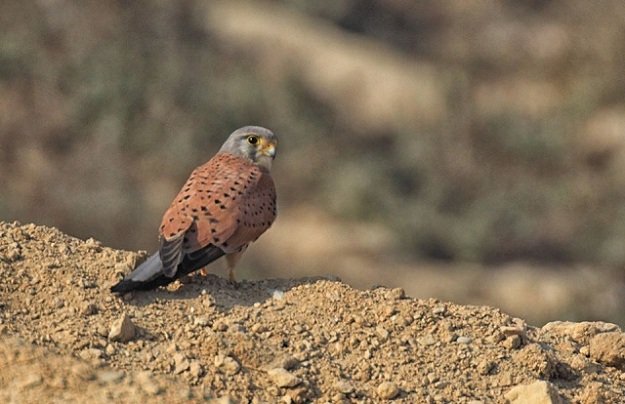
Ahead of the arrival of migratory birds across Sindh's coastal belt come winter professional poachers appear to have laid out traps to catch their prey. Over half a dozen bird trapping camps were removed by the Sindh wildlife department (SWD) in recent days, particularly from the coastal region, while poachers were warned from capturing the migratory birds. On Monday, a SWD raid party also confiscated around 17 kestrels from Empress Market.
The raid was carried out after a video depicting birds at Empress Market, caged in unsanitary conditions, went viral on social media. The colourful kestrel bird is one of the near 60 species in the Falconidae or falcon family.
"Keeping wild birds is an illegal act," said Inspector Aijaz Noondhani, who led the raid party. "All wild birds have been taken into custody," he told The Express Tribune, adding that all shop owners were warned not to sell wild birds.
According to Noondhani, poachers use kestrels as prey to hunt other falcons. "This is the season as falcons are coming to Pakistan," he said.
The poachers usually trap falcons by setting up camps on the coastal belt. Smaller birds are used at the trapping camps. "The kestrel can hover for some time. There are other smaller birds kept near the camp which ultimately deceive the falcon," explained Javed Ahmed Mahar, the provincial conservator at SWD.
Mahar said that poachers use various techniques to trap falcons and sell them in the market. "Our teams are conducting raids in various areas to trace poachers," he claimed, adding that the wildlife department was trying its best to discourage all kinds of illegal hunting across the province.
A warning was given to the errant shopkeeper, Saeed Ahmed, who assured the wildlife department that no illegal wildlife will be sold at his shop.
"We do not deal with the illegal sale of birds and animals," another shopkeeper at the market said. Some shopkeepers sell wild birds because of their high demand, he conceded, on the condition of anonymity. "Wild birds and animals are in high demand". But all shopkeepers at the market are aware of the consequences of illegal trade, he added.
According to the shopkeeper, business at the market has been slow for over six months. "There is no rush as was seen last year. This is why some people try to run their businesses with illegal trade," he said, adding that the government should support the businesses at the market.
The Empress Market counts among the most popular bird markets in the port city. The shopkeeper expressed fears of businesses vanishing in the coming years due to low profitability.
As for illegal trade, Noondhani said that frequent raids will be carried across the city to discourage the activity completely.


1721377568-0/BeFunky-collage-(18)1721377568-0-165x106.webp)



1732617223-0/Untitled-design-(69)1732617223-0-270x192.webp)

1732603037-0/BeFunk_§_]__-(51)1732603037-0.jpg)
1732610150-0/Untitled-design-(3)1732610150-0-270x192.webp)

1732608486-0/BeFunk_§_]__-(54)1732608486-0.jpg)












COMMENTS
Comments are moderated and generally will be posted if they are on-topic and not abusive.
For more information, please see our Comments FAQ